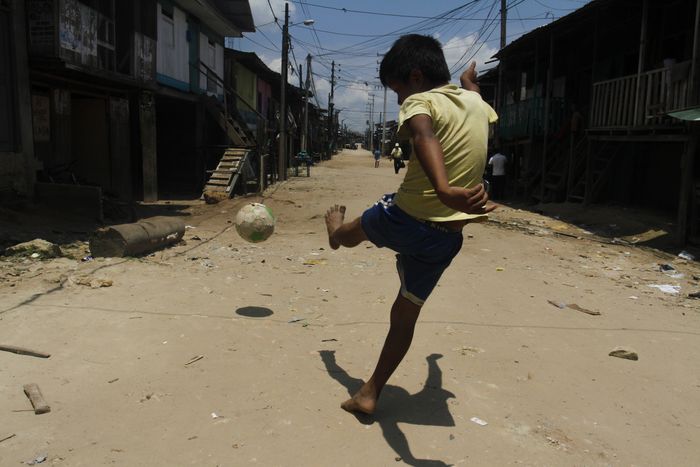During the Covid-19 pandemic, international travel was heavily restricted. With the pandemic slowly coming to an end in most parts of the world, the restart of tourism is seen as a way of reactivating the economy. Many countries, such as Peru, are placing high hopes on the resurgent industry.
By the end of the year, the Ministry of Tourism of Peru expects that the country will welcome over a million international guests plus an estimate of 25 million domestic tourists. The sector anticipates that roughly 900.000 jobs will be directly linked to the tourism sector. Thus, the government proposed more than 60 priority actions in order to support the promising sector. These promotional actions, nevertheless, pose new threats for children and adolescents whose families are working in tourism. In the light of the restarting tourism industry, well thought out strategies for the protection and care of children and adolescents must be developed and implemented.
New challenges for the protection of children's and adolescents' rights
The digital progress has influenced the diversification of services offered in the tourism sector. New accommodation platforms like Airbnb and transportation providers as Uber have been established. There are also more encounter-oriented concepts such as Experiential Tourism and Voluntourism, which are becoming more and more popular with international and national tourists. Due to the limitations of the statistics and the unregulated character of these offers, it is difficult to quantify the exact numbers. However, we see that there is a highly differentiated offer in terms of price and activities.
Some companies, for instance, have started to offer lodging and temporary accommodation which can be booked through apps. I have visited one of them myself to better understand these kinds of offers. During my stay, I came into contact with different people – among them also children. This clearly demonstrates that these new forms of accommodation pose a risk for children because of the lack of regulation and control surrounding them. While formal hotels are registered and licensed – some have even signed a child protection code – those new service providers often operate in the informal sector. The platforms, where guests can book a stay or trip, are not assuming any responsibility, for example, in case of a crime. The platforms take the position of only acting as intermediaries between the guests and hosts.
Good practice: Child Protection Law for Tourism
The prognosis, nonetheless, is not entirely discouraging. The introduction of the Code of Conduct against Sexual Exploitation of Children and Adolescents in the Sphere of Tourism for Tourism Service Providers in 2019 is an outstanding example of the strong actions to engage the sector in the fight against sexual exploitation of children and adolescents.
In 2020 and 2021, 8,710 of approximately 40.000 Peruvian tourism businesses and operatorshave signed the Code of Conduct and are obliged to report annually on the actions taken in regard to that matter. These tourism companies commit themselves to protect children and adolescents. This includes reporting immediately to the competent authority if becoming aware of any criminal offence related to the sexual exploitation of children and adolescents. As it is stated in Law N° 30802, punishment is meted out to all abusers, and those who "promote, facilitate or permit the entrance of children and adolescents to rooms of the establishments, accompanied by adult persons, without being accredited as their parents or legal guardians".
With this in mind, CHS Alternativo wants to stress the importance of the Law and its regulations. We are working in joined coordination with the Peruvian Ministry of Tourism. According to the Law, the managers of establishments bear the responsibility to prevent crimes from being committed within their facilities. This responsibility encourages the service providers to implement the regulations of the Law. Training personnel or including child protection clauses in the contracts are some of the actions service providers can take to keep children and adolescents safe.
However, the non-regulated companies and platforms are difficult to reach. So far, our work with the non-regulated sector is in coordination with the municipalities. The municipalities play an important role in identifying informal accommodation facilities and convincing them to become officially registered and licensed.
As we observe an increase in the number of non-regulated forms of accommodation and a higher interest of tourists in those activities, we demand more efforts to hold accommodation providers and intermediate platforms responsible for child protection. The growth of tourism must go hand in hand with an improvement of child protection standards.
Ana Ladera, is project coordinator for the protection of children from sexual exploitation at CHS Alternativo in Peru. CHS is member of ECPAT International.
More information:
Diario El Comercio (2022) PromPeru. “Turismo generaría un millón de empleos este año, estima Promperú” (Zugriff: 6.9.22)
Ministerio de Comercio Exterior y Turismo (2022) Mincetur publica Plan de Emergencia del Sector Turismo para impulsar su reactivación y crecimiento económico. (Zugriff: 6.9.22)
Ministerio de Comercio Exterior y Turismo (2022) Plan de Emergencia del Sector Turismo


